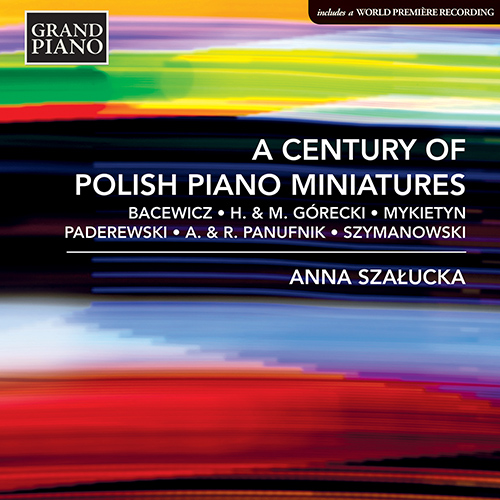
Grażyna Bacewicz (1909 - 1969)
Grazyna Bacewicz played a leading role in bringing Polish music into the twentieth-century mainstream and onto the international concert stage, as both a composer and a concertizing violinist. Following in the footsteps of Szymanowski, Bacewicz and her peers kept their roots in native Polish folksong while exploring and welcoming the possibilities offered by the invigorating trends of modernism. That this broadening of Polish musical culture was accomplished in spite of the country’s struggles during World War II and the limitations imposed by the subsequent socialist regime is a tribute to the talent, grit and determination of Bacewicz and her generation.
Born in Lodz, Poland, in 1909, she received her first musical training from her father. She played chamber music with her siblings and violin concertos with the local orchestra; by the age of twelve she had started to compose. When she graduated from the Warsaw Conservatory in 1932 (with degrees in both composition and violin performance) a concert featuring her works marked the occasion. A scholarship from the Polish virtuoso, composer and statesman Ignacy Jan Paderewski subsequently allowed her to study at the Ecole Normale in Paris. There she joined the growing list of composers studying with the redoubtable Nadia Boulanger and had her first taste of more cosmopolitan musical fashions.
After returning to Poland, she taught briefly at the conservatory in Lodz before moving to Warsaw, where she hoped to concentrate on her playing and composing. Another year of study in Paris followed, after which she accepted the position of concertmistress in the recently formed Polish National Radio Symphony Orchestra. She played and toured with the orchestra for two years. In the spring of 1939, she made another trip to Paris—this time to supervise a concert dedicated to her compositions—returning to Warsaw just months before the start of the war. Although she and her family (she had married a doctor in 1936) were displaced during the conflict and musical life in Poland was severely curtailed, Bacewicz continued to compose even under the most difficult conditions. Her works from that period include her Second String Quartet, her First Symphony and one of her most popular pieces: her Overture for orchestra.
After the war, Bacewicz renewed her concertizing and served on the juries of several international competitions. She also joined the Polish Composers Union (begun in 1945) and dedicated herself to bringing Polish music to the forefront of the international music scene. For the next decade, however, the political and cultural situation in her homeland imposed limits on what she and her colleagues could do. Her works written from 1945 to 1955 may be broadly categorized as “neo-classical” (although she objected when the term was applied to her music); after the first International Festival of Contemporary Music (known as the “Warsaw Autumn”) of 1956, she welcomed the opportunity to evolve her style in a more contemporary direction. “I disagree with those who maintain that once a composer develops her own style, she should stick to it,” she wrote. “I find such an opinion totally alien; it impedes further development and growth. Every composition completed today will belong to the past tomorrow.”


 Grand Piano has gained a reputation for producing high quality recordings of rare keyboard gems. Dedicated to the exploration of undiscovered piano repertoire, the label specialises in complete cycles of piano works by many lesser-known composers, whose output might otherwise have remained unknown and unrecorded.
Grand Piano has gained a reputation for producing high quality recordings of rare keyboard gems. Dedicated to the exploration of undiscovered piano repertoire, the label specialises in complete cycles of piano works by many lesser-known composers, whose output might otherwise have remained unknown and unrecorded.






